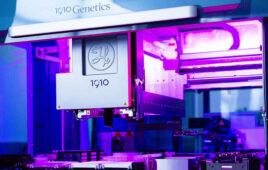
After exposing genetically manipulated mice to respond to a common antigen found in human liver cancer, Georgia Cancer Center scientists believe they can turn T cells into fighters against the disease.
The researchers studied mice engineered to express the human leukocyte antigen, which helps regulate the immune system. The antigen helped the mice produce the powerful T cells against liver cancer.
The researchers immunized the mice with the antigen α-fetoprotein, which is found in 70 to 80 percent of human liver cancers, and serves as both a biomarker for diagnosing and a target for treating the sixth most common cancer worldwide.
“For the T cell to recognize the tumor cell, it has to have a receptor for that tumor cell,” corresponding author Yukai He, PhD, an immunologist at the Georgia Cancer Center and Department of Medicine at the Medical College of Georgia at Augusta University, said in a statement.
In the study, the team took the genes for the most effective liver cancer antigen receptors on the T cells and put the receptors on human T cells. This resulted in engineered human T cells that eradicated the cancer without hurting normal liver cells.
“These T cells are very potent and can kill human liver cancer both in a dish and in a mouse,” He said.
The researchers found that large human liver cancer tumors on comparatively small mice, started regressing approximately 20 days after treatment and were eradicated by the 41st day with the aid of one of the targeted receptors.
“Now that we have these T cell receptor genes, we may be able to humanize the genes to help patients,” He said.
T cells have receptors that recognize infections or cancers, but the drivers of the immune response is often not as effective at attacking cancer. This is likely because cancer cells are mostly a mutation of a person’s own cells.
“Most cancers are self-antigens,” He said. “Our body’s immune cells are not supposed to fight them, otherwise it becomes autoimmune disease.”
He will now collaborate with the Piedmont Atlanta Hospital to retrieve T cells, liver cancer cells and healthy tissue normally removed from patients during surgery, put the mouse receptor genes on the T cells, monitor in a dish to see how the cells fight the tumor, and react to healthy human tissue.
If the engineered human T cells do produce a robust cancer attack and do not generate toxicity by also attacking healthy cells, the researchers would then conduct clinical trials.
Newer cancer treatments, like adoptive T cell therapy, use a variety of ways to strengthen T cells for the fight and He said the mouse receptor genes could be another way to do that.
According to the US Centers for Disease Control and Prevention, rates of new liver cancer increased 38 percent from 2003 to 2012. Nearly 23,000 people died from liver cancer in 2012, representing a 56 percent increase in deaths from 2003. Men died from liver cancer at more than twice the rate of women.
Filed Under: Genomics/Proteomics




